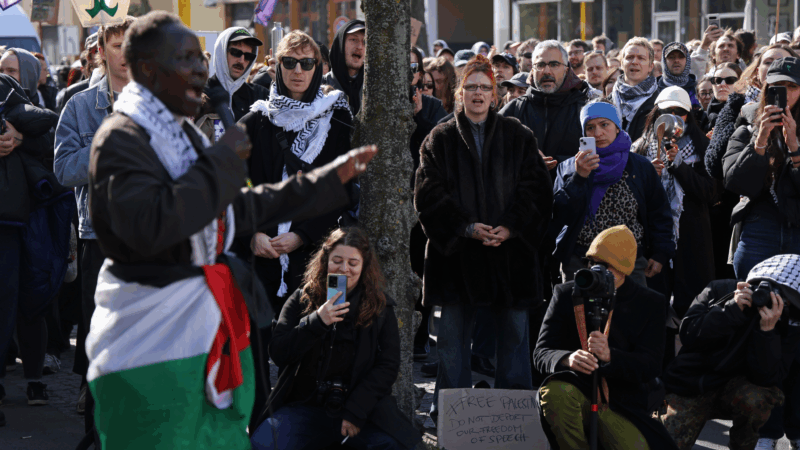Germany seeks to deport an American and 3 EU citizens after pro-Palestinian protest
LONDON — Berlin’s Immigration Office has told three European Union citizens and one American they are to be deported from Germany this week over alleged actions at protests against Israel’s war in Gaza. Their cases have not yet been heard in court.
The four demonstrators — two from Ireland, one from Poland and one from the United States — were served with orders last month, instructing them to leave Germany by April 21 or be deported. The Berlin Immigration Office says the deportation orders are connected to a protest at Berlin’s Free University in October 2024.
Germany’s push to deport protesters supporting Palestinians has drawn comparisons with the Trump administration’s handling of pro-Palestinian student protesters in the U.S. There are concerns that by restricting the freedom of movement of the three EU citizens, these deportation orders may clash with EU law, which enshrines freedom of movement as a founding principle.
In an email to NPR, a spokesperson for the Berlin Immigration Office, Marcus Jähnke, confirmed it had revoked the residence permits of four “pro-Palestinian activists” and this was “in connection with a pro-Palestinian protest” where “masked individuals” entered a university building and caused “property damage including graffiti.”
The Berlin Senate Department for the Interior and Sport, which is responsible for the city’s immigration office, told NPR in a statement that criminal proceedings are still “ongoing” but did not say what the individuals are charged with and said it would not comment further, citing “privacy reasons.”
Alexander Gorski, a criminal defense and migration lawyer in Berlin representing some of the protesters, says they are appealing the requirement to leave Germany by the April 21 deadline.
Irish citizen Shane O’Brien has already been given an emergency injunction pausing his expulsion and allowing him to remain in Germany until a full hearing into his case. Gorski says he is confident the other three demonstrators will receive the same — allowing them to remain in Germany to appeal their deportations.
Those served with deportation orders say they have no information about charges
Roberta Murray, a 31-year-old artist from Ireland who works in a café in Berlin, is the other Irish citizen threatened with deportation. Murray tells NPR by phone that they were in the middle of a supermarket when they first heard from their lawyer about the deportation order back in January. A letter from the Berlin Immigration Office notified Murray of the office’s intention to end Murray’s freedom of movement within the EU.
Murray has lived in Berlin for three years and has no criminal convictions. As an EU citizen, Murray has a right to settle and work anywhere in the European Union.
“I spoke to my lawyer and she said deportation can take a couple of years, and that we would fight it in the courts,” Murray says.
In March, Murray received another, much longer letter from the Berlin Immigration Office.
The letter, which NPR has reviewed, reads: “If you do not voluntarily leave the country by April 21, you are hereby threatened with deportation to Ireland.”
Cooper Longbottom, a 27-year-old student from Seattle who is studying for a master’s in social work in Berlin, received the same letter.
“I hadn’t expected it to go this way at all,” Longbottom says. “I hadn’t gotten any charges in the mail. It’s just a complete mess and not how the order of criminal law and due process is supposed to go.”
Murray and Longbottom are continuing to work and study in Berlin while they appeal the deportation notice. They say they have no intention of leaving.
“I live here with my partner. I work in a café. I make art here. I have a studio,” says Murray. “None of us are making any plans to leave. We all feel very defiant and confident that this won’t pass through the legal system.”
While Berlin authorities cite criminal proceedings against them, their lawyer Gorski says none have any criminal convictions and haven’t been given court dates or other information about the charges against them.
“We haven’t even seen the files yet,” Gorski says, “so we don’t even know what exactly our individual clients are accused of doing that day.”
The fourth protester facing possible deportation, Polish citizen Kasia Wlaszczyk, received the same letters. In an opinion piece in the Guardian newspaper, Wlaszczyk, a cultural worker based in Berlin, wrote they are filing a motion of interim relief against the April 21 deadline and filed a lawsuit against the deportation.
Germany’s Staatsräson and responsibility toward Israel
The second letter sent to Murray cites the concept of Staatsräson as part of the grounds for the deportation.
The letter says, “The right of Israel to exist, its protection, and the integrity of the State of Israel are matters of German state policy” and that this is “especially significant given Germany’s historical responsibility toward Jewish people in its federal territory and in the State of Israel.”
It adds that “at no time — whether domestically or abroad — should there be any doubt that opposing movements within Germany will be tolerated in any way.”
Gorski says this is the first time he’s seen the idea used to justify deportation.
“It’s highly troubling because the Staatsräson, meaning the unconditional solidarity of Germany with the Israeli state, is not a legal concept, it’s a political concept,” Gorski says.
The Central Council of Jews in Germany has said it supports the planned deportation of the protesters.
The Irish Taoiseach or Prime Minister Micheál Martin told parliament he would raise the case of the Irish nationals with the German authorities.
Longbottom, the American student, says no one from the Trump administration has been in touch regarding their case yet. In response to NPR’s request for comment, the State Department said in a written statement from the press office, “We are aware of reports of a U.S. citizen facing possible deportation from Germany. The Department has no higher priority than the safety and security of U.S. citizens abroad.”
Michele Kelemen contributed to this report from Washington, D.C.
Transcript:
LEILA FADEL, HOST:
Government officials say university protesters supporting Palestinian should be deported from Germany. German authorities say the country’s historical responsibility toward the Jewish people in the state of Israel are part of the rationale. NPR’s Fatima Al-Kassab reports.
(SOUNDBITE OF ARCHIVED RECORDING)
UNIDENTIFIED PROTESTER: (Non-English language spoken).
UNIDENTIFIED PROTESTERS: (Non-English language spoken).
FATIMA AL-KASSAB, BYLINE: Police dragging protesters from a pro-Palestinian encampment at Berlin’s Free University last May.
(SOUNDBITE OF ARCHIVED RECORDING)
UNIDENTIFIED PERSON: (Speaking German).
AL-KASSAB: In Germany, authorities at the highest level have taken notice of these protests.
COOPER LONGBOTTOM: My name’s Cooper. I’m 27. I moved to Berlin in September of 2023.
AL-KASSAB: Cooper Longbottom came from Seattle to do a master’s in social work. When we spoke on the phone, Longbottom described getting involved in pro-Palestinian protests in the city shortly after the war in Gaza began.
LONGBOTTOM: I joined demonstrations, as well as started organizing on campus to demand specific things of the university, like an academic boycott of Israeli institutions.
AL-KASSAB: Then in January this year, Longbottom received a letter from the Berlin immigration authorities.
LONGBOTTOM: The letter that I received essentially said that they intended to deport me.
AL-KASSAB: Longbottom is one of four demonstrators – two from Ireland, one from Poland – who have been told they are to be deported from Germany over accusations of antisemitism and support for terrorism over alleged actions at protests against Israel’s war in Gaza. In an email to NPR, Berlin’s Immigration Office confirmed it had revoked the residence permit of four, what it called, pro-Palestinian activists. It said this was, quote, “in connection with a pro-Palestinian protest where masked individuals entered a university building and caused property damage, including graffiti.” It added that criminal proceedings are still ongoing, but did not say what the individuals were being charged with and said it would not comment further for privacy reasons. Defense lawyer Alexander Gorski says they haven’t been told what they’re being charged with.
ALEXANDER GORSKI: They have no criminal convictions. As criminal defense lawyers, we haven’t even seen the files yet, so we don’t even know what exactly our individual clients are accused of.
AL-KASSAB: Roberta Murray got the same letter back in January.
ROBERTA MURRAY: I was actually out doing shopping and I was in the middle of a supermarket when I opened my email.
AL-KASSAB: Murray is a 31-year-old artist from Ireland who works at a cafe in Berlin and has lived there for years.
MURRAY: And then in March, we received a very long document outlining why we’re being deported and telling us that we’re such a threat to the German society that we have to leave the country by April 21.
AL-KASSAB: NPR has seen the letter which says, if you do not voluntarily leave the country by April 21, you are hereby threatened with deportation to Ireland. Longbottom, the American student, risks losing a visa. But for the Irish demonstrators who are European citizens, the right to reside anywhere in the European Union is enshrined in EU law as a founding principle. But while the letter cites EU law and alleges they are deportable because they pose a significant threat to security, Gorski says that hasn’t been proven yet.
GORSKI: Normally, that is only achieved if you have higher prison sentences. In this case, none of the four have ever been criminally convicted of a crime.
AL-KASSAB: The letter sent to Murray, one of the Irish citizens, says, quote, “the right of Israel to exist, its protection and the integrity of the state of Israel are matters of German state policy” and that at no time should there be any doubt that opposing movements within Germany will be tolerated in any way. Lawyer Gorski says he’s never seen the idea used to justify deportation before. Ireland’s prime minister has said he will raise the issue of the two Irish nationals with the German authorities. The American student, Cooper Longbottom, says no one from the Trump administration has been in contact yet.
Fatima Al-Kassab, NPR News, London.
(SOUNDBITE OF MUSIC)
This quiet epic is the top-grossing Japanese live action film of all time
The Oscar-nominated Kokuho tells a compelling story about friendship, the weight of history and the torturous road to becoming a star in Japan's Kabuki theater.
The Live Nation trial could reshape the music industry. Here’s what you need to know
On Tuesday opening statements will begin for the federal antitrust trial against Live Nation, one of the largest entertainment companies in the world.
A new one-a-day-pill holds promise for HIV’s ‘forgotten population’
It's designed to take the place of complicated, multiple drug regimens that many people with HIV need to follow. And it's also beneficial because the HIV virus is always evolving.
For filmmaker Chloé Zhao, creative life was never linear
Director Chloé Zhao used meditation, somatic exercises and dance to inspire the cast and crew of this Oscar-nominated story about William Shakespeare's family.
10 new books in March offer mental vacations
March is always a big one for books – this year is no different. We call out a handful of upcoming titles for readers to put on their radars — offering a good alternative to doomscrolling.
Sen. Chris Coons, D-Del., talks about the war with Iran and upcoming war powers vote
NPR's A Martínez asks Delaware Democrat Chris Coons, a member of the Senate Foreign Affairs Committee, about the war with Iran.







